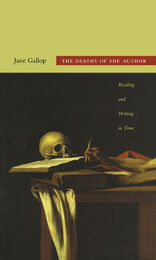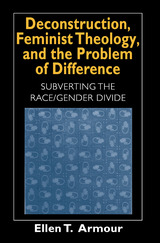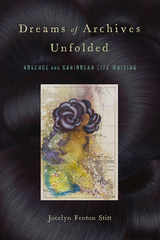133 books about Feminist and 4
start with D
133 books about Feminist and 4
133 books about Feminist
4 start with D start with D
4 start with D start with D

The Deaths of the Author
Reading and Writing in Time
Jane Gallop
Duke University Press, 2011
For thirty years the "death of the author" has been a familiar poststructuralist slogan in literary theory, widely understood and much debated as a dismissal of the author, a declaration of the writer's irrelevance to the readers experience. In this concise book, Jane Gallop revitalizes this hackneyed concept by considering not only the abstract theoretical death of the author but also the writer's literal death, as well as other authorial "deaths" such as obsolescence. Through bravura close readings of the influential literary theorists Roland Barthes, Jacques Derrida, Eve Kosofsky Sedgwick, and Gayatri Chakravorty Spivak, she shows that the death of the author is best understood as a relation to temporality, not only for the reader but especially for the writer. Gallop does not just approach the death of the author from the reader's perspective; she also reflects at length on how impending death haunts the writer. By connecting an author's theoretical, literal, and metaphoric deaths, she enables us to take a fuller measure of the moving and unsettling effects of the deaths of the author on readers and writers, and on reading and writing.
[more]

Deconstruction, Feminist Theology, and the Problem of Difference
Subverting the Race/Gender Divide
Ellen T. Armour
University of Chicago Press, 1999
The term "feminism" conjures up the promise of resistance to the various forms of oppression women face. But feminism's ability to fulfill this promise has been undermined by its failure to deal adequately with the difference that race makes for gender. In this book, Ellen T. Armour forges an alliance between deconstruction and feminist theology and theory by demonstrating deconstruction's usefulness in addressing feminism's trouble with race.
Armour shows how the writings of Jacques Derrida and Luce Irigaray can be used to uncover feminism's white presumptions so that race and gender can be thought of differently. In clear, concise terms she explores the possibilities and limitations for feminist theology of Derrida's conception of "woman" and Irigaray's "multiple woman," as well as Derrida's thinking on race and Irigaray's work on religion. Armour then points a way beyond the race/gender divide with the help of African-American theorists such as bell hooks, Hortense Spillers, and Patricia Hill Collins.
Armour shows how the writings of Jacques Derrida and Luce Irigaray can be used to uncover feminism's white presumptions so that race and gender can be thought of differently. In clear, concise terms she explores the possibilities and limitations for feminist theology of Derrida's conception of "woman" and Irigaray's "multiple woman," as well as Derrida's thinking on race and Irigaray's work on religion. Armour then points a way beyond the race/gender divide with the help of African-American theorists such as bell hooks, Hortense Spillers, and Patricia Hill Collins.
[more]

Delia's Doctors; or, A Glance behind the Scenes
Hannah Gardner Creamer
University of Illinois Press, 2002
A lost 19th century novel focused on several women's issues, especially female health; with a fascinating view of mid-nineteenth-century medical practices.
This early feminist novel is a wickedly funny slice of mid-nineteenth-century Americana peppered with details of the era’s freakish medical tactics and leavened with a smart and sassy commentary about the societal restraints on women’s physical and intellectual abilities.
First published in 1852, Delia’s Doctors is one of four known novels by Hannah Gardner Creamer, an American writer whose life and career have been all but absent from the annals of American history. In the book, eighteen-year-old Delia Thornton is ill. Her condition, more psychological than physical, worsens during the bitter winter, even as doctor after doctor attempts to cure her.
As Delia typifies the female heroine whose sickness is aggravated by listlessness and inactivity, her brother’s fiancée, Adelaide Wilmot, is Delia’s more robust counterpart. Adelaide thinks she could do anything, if only she were a man, and she dreams of being a physician. Quick to point out the shortcomings of male doctors in treating female illnesses, Adelaide saves Delia and delivers a series of arguments against New England patriarchy.
This early feminist novel is a wickedly funny slice of mid-nineteenth-century Americana peppered with details of the era’s freakish medical tactics and leavened with a smart and sassy commentary about the societal restraints on women’s physical and intellectual abilities.
First published in 1852, Delia’s Doctors is one of four known novels by Hannah Gardner Creamer, an American writer whose life and career have been all but absent from the annals of American history. In the book, eighteen-year-old Delia Thornton is ill. Her condition, more psychological than physical, worsens during the bitter winter, even as doctor after doctor attempts to cure her.
As Delia typifies the female heroine whose sickness is aggravated by listlessness and inactivity, her brother’s fiancée, Adelaide Wilmot, is Delia’s more robust counterpart. Adelaide thinks she could do anything, if only she were a man, and she dreams of being a physician. Quick to point out the shortcomings of male doctors in treating female illnesses, Adelaide saves Delia and delivers a series of arguments against New England patriarchy.
[more]

Dreams of Archives Unfolded
Absence and Caribbean Life Writing
Jocelyn Fenton Stitt
Rutgers University Press, 2021
The first book on pan-Caribbean life writing, Dreams of Archives Unfolded reveals the innovative formal practices used to write about historical absences within contemporary personal narratives. Although the premier genres of writing postcoloniality in the Caribbean have been understood to be fiction and poetry, established figures such as Erna Brodber, Maryse Condé, Lorna Goodison, Edwidge Danticat, Saidiya Hartmann, Ruth Behar, and Dionne Brand and emerging writers such as Yvonne Shorter Brown, and Gaiutra Bahadur use life writing to question the relationship between the past and the present. Stitt theorizes that the remarkable flowering of life writing by Caribbean women since 2000 is not an imitation of the “memoir boom” in North America and Europe; instead, it marks a different use of the genre born out of encountering gendered absences in archives and ancestral memory that cannot be filled with more research. Dreams of Archives makes a significant contribution to studies of Caribbean literature by demonstrating that women’s autobiographical narratives published in the past twenty years are feminist epistemological projects that rework Caribbean studies’ longstanding commitment to creating counter-archives.
[more]
READERS
Browse our collection.
PUBLISHERS
See BiblioVault's publisher services.
STUDENT SERVICES
Files for college accessibility offices.
UChicago Accessibility Resources
home | accessibility | search | about | contact us
BiblioVault ® 2001 - 2024
The University of Chicago Press









